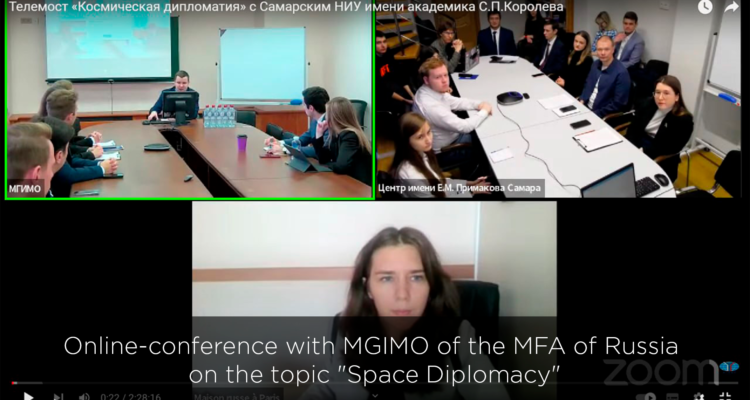On October 26, The Primakov Centre jointly with MGIMO University MFA of Russia organised online conference on the topic “Space Diplomacy”, which was held as part of the II International scientific and practical conference “Digital International Relations 2023”. The conference united experts representing business, science and government agencies. The participants were also able to discuss the impact of technology on world politics.
The event was opened with a report by Anastasia Tolstikova, a 4th-year student of Samara University majoring in International Relations, on the topic “Space Diplomacy: History and modernity”:
“The development of space is not connected with “international” cooperation, but with “universal”, i.e. open to all countries and peoples, pursuing not national interests, but civilizational ones. It is space that can become a key link for the transition to the theory of security communities in the long term.”
Employee of Russian Centre of Science and Culture in Paris (Rossotrudnichestvo) Asya Ovchinnikova and French cosmonaut, Hero of the Soviet Union Jean-Louis Chretien stressed the need to continue interstate cooperation in the space sphere, as the implemented projects are very important for all actors of international relations and are the heritage of mankind. In his address , the cosmonaut stressed:
“People who have worked in space, regardless of what country they are from, and who were lucky enough to do one thing together, were able to understand how much they want to continue working as a team. Here, at high altitude, in orbit, far from the surface of the Earth, there are no problems”.
As part of the report of the MGIMO Space Diplomacy Club, presented by Nelson Avakian, a 4th-year student of the MGIMO Faculty of International Relations, the following issues related to legal support of modern international projects, as well as current missions and prospects were put forward on the agenda of the meeting as exciting topics. Russia, being a leader in the space industry, is actively developing international cooperation in this area. Joint work with other countries makes it possible to create and use the latest space technologies in various fields of activity. Russia is actively working with Belarus, China, Saudi Arabia, the United Arab Emirates and African countries to create joint projects and conduct research.
The conversation about the economic dimensions of Russian space projects was continued by the team of the Oeconomicus Economic Club (MGIMO) under the leadership of the Deputy Head of the Oeconomicus Economic Club (MGIMO) Anastasia Makarenko. As part of the report, the students presented the results of their research, among which several of the most important trends in the development of the space economy were highlighted, concerning the commercialization of space activities, the globalization of international economic and legal relations in the field of space, the processes of creating a legal framework for the successful functioning of the economic sector in space activities, orientation towards the development of dual technologies and dual innovations.
Environmental problems of space programs were raised by representatives of the Association of Regional Youth and the Youth Council at the Representation of the Samara region.
At the end of the conference, Alexander Ulanov, Deputy Vice-Rector for Legal, Administrative Affairs and Digitalization of the MGIMO University MFA of Russia, noted the need for further development of space research, and also expressed hope for further development of joint projects with The Regional Centre for the Development of Public Diplomacy and International Relations named after Yevgeniy M. Primakov.
Photo: Daria Yurlova.





